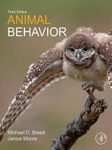![Advances in Ecological Research, Volume 59 Advances in Ecological Research, Volume 59]()
Click to have a closer look
About this book
Contents
Customer reviews
Biography
Related titles
Recommended titles
About this book
Next Generation Biomonitoring, Part 2 is the second part of a thematic on ecological biomonitoring. It includes specific chapters that cover aquatic volatile metabolomics using trace gases to examine ecological processes, next generation approaches to rapid monitoring Bio-aerosol and the link between human health and environmental microbiology, NGB in Canadian wetlands, CELLDEX/global monitoring of functional responses, Citizen Science and Biomonitoring, and more.
This volume follows on Advances in Ecological Research, Volume 58: Next Generation Biomonitoring, Part 1.
Contents
1. Aquatic volatile metabolomics – using trace gases to examine ecological processes
Michael Steinke
2. Next generation approaches to rapid monitoring Bio-aerosol and the link between human health and enviromental micorbiology
Robert Michael William Ferguson
3. NGB in Canadian wetlands
Donald Baird
4. Monitoring the biodiversity and functioning of terrestrial systems via high resolution trace gas fluxes
Kelly Robert Redeker
5. Computational approaches to gathering biomonitoring data from social media platforms: a superior solution to next generation biomonitoring challenges?
Jon Chamberlain
6. What more can the eDNA-NGS revolution bring to biomonitoing? - the untaped potenial of molecular methods
Alex J. Dumbrell
7. Bioinformatics for Biomonitoring: Species Detection and Diversity Estimates across Platforms and Tools
Joanne E. Littlefair
8. Derocles et al. Statistics from networks or other BioMonitoring – what are the statistics of measuring and evaluating change?
Athen Ma
9. CELLDEX/global monitoring of functional responses
Scott Tiegs
10. Citizen Science and Biomonitoring
Michael Pocock
Customer Reviews
Biography
Dave Bohan is an agricultural ecologist with an interest in predator-prey regulation interactions. Dave uses a model system of a carabid beetle predator and two agriculturally important prey; slugs and weed seeds. He has shown that carabids find and consume slug prey, within fields, and that this leads to regulation of slug populations and interesting spatial `waves' in slug and carabid density. The carabids also intercept weed seeds shed by weed plants before they enter the soil, and thus carabids can regulate the long-term store of seeds in the seed bank on national scales. What is interesting about this system is that it contains two important regulation ecosystem services delivered by one group of service providers, the carabids. This system, therefore, integrates, in miniature, many of the problems of interaction between services. Dave has most recently begun to work with networks. He developed, with colleagues, a learning methodology to build networks from sample date. This has produced the largest, replicated network in agriculture. One of his particular interests is how behaviours and dynamics at the species level, as studied using the carabid-slug-weed system, build across species and their interactions to the dynamics of networks at the ecosystem level.
Dr Alex Dumbrell works at the School of Biological Sciences, University of Essex, UK.
Guy Woodward is Professor of Ecology in the Department of Life Sciences at Imperial College London and Series Editor for Advances in Ecological Research. He has authored over 100 peer-reviewed publications, including recent papers in Nature, Science and Nature Climate Change, with a strong emphasis on understanding and predicting how aquatic ecosystems and food webs respond to a wide range of biotic and abiotic stressors, including climate change, chemical pollution, habitat degradation and invasive species. Much of this work covers multiple scales in space and time and also a range of organisational levels – from genes to ecosystems. His research group and ongoing collaborations span the natural and social sciences, reflecting the need for multidisciplinary approaches for addressing the environmental challenges of the 21st Century.
Dr Michelle Jackson works at Imperial College London.












































